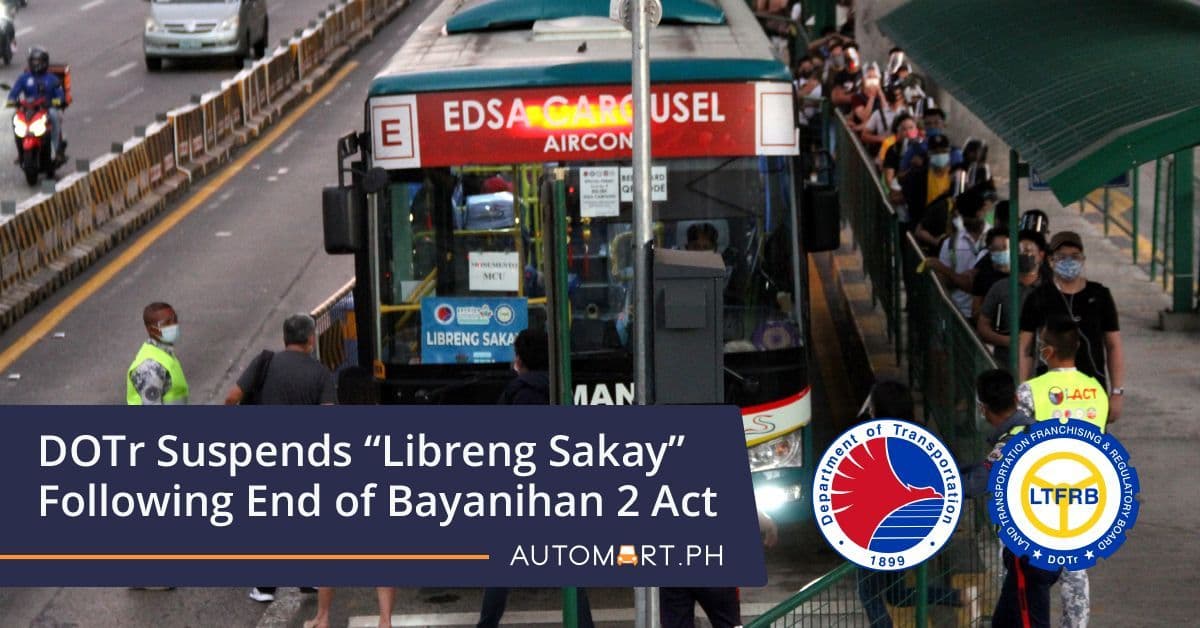
DOTr Suspends “Libreng Sakay” Following End of Bayanihan 2 Act
Updated on December 17 2025
Suspension Affects Commuters and PUV Drivers
The Department of Transportation (DOTr) suspends the “Libreng Sakay” program following the end of the Bayanihan 2 Act last June 30. The free ride service program was implemented by the DOTr and the Land Transportation Franchising and Regulatory Board (LTFRB). It is one of the Covid-19 pandemic assistance schemes enacted to help commuters and PUV drivers. This program falls under the Bayanihan to Recover As One Act, also known as Bayanihan 2 Act.
The suspension of this transportation program has several effects, but in the main, both commuters and public utility vehicle (PUV) drivers lose a vital aid that allows them ease of commute and steady daily income.
For PUV drivers, the suspension of the program means losing subsidized aid at a time when they all but lost their source of livelihood (from the time the pandemic began to the present). Under the “Libreng Sakay” program, PUV drivers earned not from getting as many passengers as they can carry. Instead, it is based on the number of kilometers that they traveled.
Likewise, commuters, particularly those in frontline roles and customer-facing occupations (frontliners and Authorized Persons Outside Residence, or APORs) were able to enjoy relief from high commuting expenses. With the “Libreng Sakay” program now suspended, they may no longer expect to enjoy free rides and would have to contend with public transportation at tremendously increased fares. Before its suspension, the “Libreng Sakay” program was able to assist in over 27 million commuters (composed mainly of frontliners and APORs) around the country.
Will the Surplus Budget Extend the Program? Unfortunately, No.
Another effect of this suspension is the reversion of surplus funds of over Php 3.7 billion pesos to the National Treasury. This excess budget (or unused funds) was automatically reverted back to the Bureau of the Treasury when the “Libreng Sakay” program was suspended as Bayanihan 2 expired last June 30, 2021.
This excess budget is the crux of contention now because it cannot be reallocated and used to continue running the program without new legislation.
In a move to extend the program and support both the commuters and PUV drivers directly affected by the suspension, the LTFRB has requested Php 3 billion from the Department of Budget and Management (DBM) under the 2021 General Appropriations Act (GAA).
This action has gained support from key figures. Senator Risa Hontiveros has stated the rising cost of commuter fares will have a domino effect on both commuters and PUV drivers and calls for the extension of the program using the 2021 budget. Transportation Panel Chair and Samar Representative, Edgar Mary Sarmiento, also extended his support stating that the “Libreng Sakay” program has not only given many Filipinos an alternative way to earn income, it has also helped the frontliners, essential workers, and APOR commuters a lot.
LTFRB’s Caveat: 2021 Budget May Not Be Enough
While the LTFRB is in the process of requesting Php 3 billion from the 2021 budget, Chairman Martin Delgra III isn’t optimistic as to how long it may last. Delgra alludes to the funds disbursed to the PUV drivers and operators before the suspension as the basis for his assessment. However, he is hopeful just as Senator Francis Pangilinan is, that if the validity of Bayanihan 2 is extended and combined with the 2021 budget, there may be enough funds to continue operating the “Libreng Sakay” program. For now, the free rides are in limbo—and so are the commuters and PUV drivers.